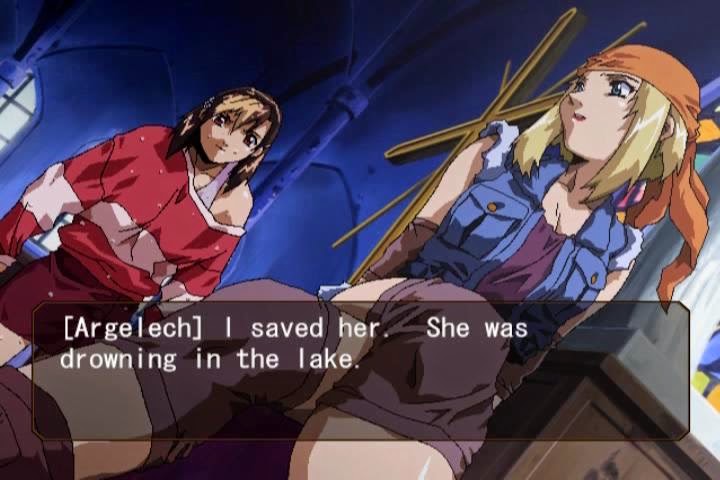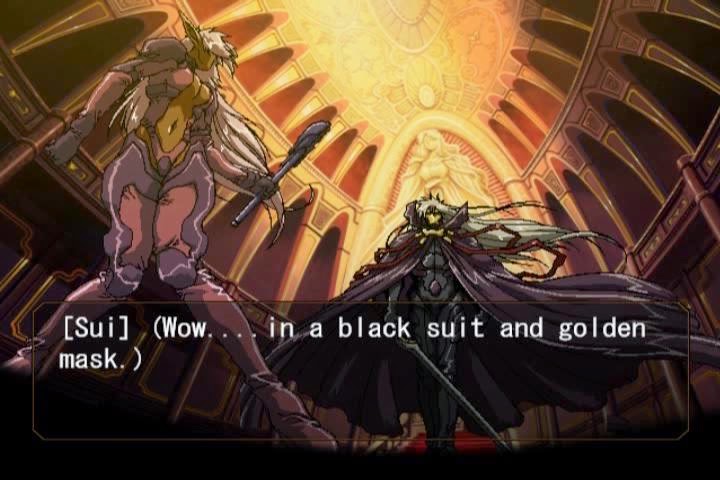Title: Exodus Guilty
Original title: エクソダスギルティー
Release date: 1998-11-06
English release date: 2005-11-28 (Vol. 1)
2006-09-15 (Vol. 2)
2006-12-10 (Vol. 3)
Developer: AbelEnglish publisher: Hirameki International
"Exodus Guilty" was one of the visual novels released by the dead and buried Hirameki in the horrible DVD-PG format for a supposed compatibility with more devices. That's not unusual of the said company. It wasn't even unusual for them to cut the sex scenes. What is a bit more strange, is that the game was split into three volumes, which were released separately.
Originally EG was released for PS, DC and PC platforms as a single game, but was split into three volumes for a Japanese DVD-PG release, which is what we got exported to the west, sans H-content (which wasn't actually present in the original PS and DC versions).
 |
| She says half of that sentence in English. |
"Exodus Guilty" is an adventure story spanning 15 centuries and steeped in Judeo-Christian mythology. Yes, the "Exodus" in the title does refer to Moses' journey from Egypt to the Land of Canaan. That would be an interesting concept if Japanese had any actual understanding of the Biblical myths. Now, instead of an epic adventure story, we get a so-so game which drops some pseudo-religious gibberish into the cauldron and pretends it has some deeper meaning. Majority of religious references are made up or simply incorrect (calling Moses a Muslim leader is the most egregious example). It's like a Hollywood company taking a similar concept and turning it into an action movie which can satisfy no audience... oh, wait, they have just did that!
 |
| Will we see Isaac too? |
The original game had map movement scenes... which were cut from the DVD-PG release. The original game would present a map screen where you visit various places looking for the next scene which would advance the plot (think "Divi-Dead" or "Eve: Burst Error"). Map movement now happens automatically. That's why scene transition makes no goddamn sense! Can you imagine an "Eve: Burst Error" DVD-PG conversion with the "look/talk/go" interface removed and everything happening automatically. Yes, the game would stop making any sense. It would be a nightmare. The same problem sadly happened with "Exodus Guilty".
 |
| Yeah, it's a rather dull game. |
One positive aspect of the game is a full voice acting (though there are some unvoiced scenes). Almost every person (including the protagonists) has voice acting, which is quite competent. That is actually one of the best things about EG. Every character has a distinctive voice and doesn't fall afoul of some Japanese voice acting tropes, like giving minor characters overly exaggerated theatrical voices (I'm looking at you, "Swan Song"). The graphics are also very nice looking. They have that sweet old-school look prevalent in visual novels from the last decade of the 20th century. The drawback is that the character sprites are not expressive and are always portrayed in the same position. On the other hand, backgrounds are very pretty and there is a large number of CGs and even fully animated cutscenes. The producers didn't skimp in this department and it shows. Sadly the sexual content has been removed from the western release, but the references are left intact and it's clear when the sex scenes occur. The characters even talk about that afterwards.
 |
| My gratitude is boundless. |
Present
While the title of this volume is "Present", it starts by introducing us with the events in the Past and the Future. Those introductions are also repeated in their appropriate chapters and I'll leave them there.
"Present" deals with a high class treasure hunter Shindo Kasumi, who arrives to an unidentified European country, where his childhood acquaintance Tachibana Reina is overseeing an archaeological dig dating back to 1200 BC (Ales' time). He will also get a chance to see his fiancée Ai, Reina's sister. The fiancée thing is more like a joke, where their parents thought that they would be a good match together. Kasumi remembers Ai being a shy and gentle girl, thus his worldview is severely shaken, when it appears that Ai has become a tsundere tomboy during his ten year long absence. Not that it matters much for him - Kasumi is a greedy little bastard and he mostly cares about money and tomb robbing, which is highly ironic, considering Reina hates tomb robbers with passion. Thus Kasumi pretends to be a simple 18 year old tourist coming here for a sightseeing tour.
 |
| A true zen mantra. |
The dig is sponsored by the Richter Foundation and its owner Arariel von Richter (mistranslated as Ararael Fond Lihitel) also has a hidden agenda, plus he appears to suspect Kasumi of being more than he lets on. The local people are waiting for the return of their Goddess and claim that the end of the world is near. Oh, and there are at least 3 more treasure hunters engaged in this mess. And it IS a mess. Characters shifting allegiances, and plots within plots make the game hard to follow and not in a good way. It's like everyone wants something but they don't know what.
 |
| Female bonding. |
The chapter is also pretty boring. For all the convoluted plot, the first two thirds of the game consist of Kasumi just walking, talking and being an idiot. He doesn't even do anything meaningful to justify his title of master treasure hunter. On the contrary, he appears to be a bit dumb. He loses his gear, he almost dies under water, and then he allows a kidnapping, which could have been easily prevented, to happen, due to his incompetence. Thus this is a classical case of the game telling us that our protagonist is a genius, while all we see is an idiot. Which is ironic, because Kasumi treats players like idiots. He repeats the same infodump drivel over and over ad nauseam. We get it! We got it when you said it the first ten times - we are not developmentally handicapped and we are not goldfish! We remember what you said five minutes ago!
 |
| Sister rivalry. |
On a positive note, game does manage to redeem itself at the end. The end is positively explosively fantastic, and the characters suddenly get smart. Kasumi, Ai and Reina make choices that were probably the smartest decisions they made throughout the whole game. It all worked exactly as I hoped it would but couldn't expect it actually happening. If only there was a proper character development leading to the ending, I would have been more satisfied than I am now.
 |
| Boom, headshot! |
Past
In the Past (1200 BC), Voice of God, Masa, is performing a dance when the Oracle of Fire - messenger from the God - arrives and burns Masa. Her adopted son Ales tries to protect her, but she rebukes him saying that striking God's servant is surely a bad idea. Oracle demands a sacrifice, which Masa refuses to do, and leaves. A few days later, Masa talks to Ales and tells him that she is going to die, and the divine wrath might level the village. She encourages him to leave for the neighbouring town of Plen Arc, where he is supposed to meet Voice of God, Will, who also refused to be sacrificed to God. However, upon reaching Plen Arc, Ales sees that the town has been completely destroyed by fire and wind.
 |
| Tell yourself that, buddy. |
 |
| Please, retry. |
Ales is a much more likable protagonist than Kasumi. While the latter was an anti-hero with a vicious streak, the former is actually a pacifist determinator. He is determined to reach his destination, but tries to do this by employing the most peaceful methods possible. None of the characters are particularly well fleshed or that interesting, but that is understandable as they each represent some sort of fairy tale archetype: a helpful guide, a strong sidekick, a worthy opponent, a funny old man, a fair maiden and etc. All of the characters are overly melodramatic and, frankly, unbelievable. Ales/Flare romance seems rushed and Ales himself acts like a medieval knight, despite the game being set in a Bronze Age. Not that I particularly minded such treatment.
 |
| You're a doctor? |
Future
In the Future (13800 AD), the humanity has been destroyed. There is very little humans left alive and they live in single region. All the knowledge of the past is in the hands of the Royal Family and is kept away from the common people. Sui and Lalaila are adopted sisters living with their guardian Nene in a city of Gina Ii, and making their living selling flowers. One day they bring the flowers to the royal castle, but the place is in an uproar. Apparently a person named Zazan has just successfully performed a coup d'etat and took control of the castle. The confused sisters leave, but their troubles are not over. They learn that Sui is actually a princess from the previous Royal Family, and it is her duty to overthrow Zazan. Nene is murdered by Zazan's men and Sui flees the city with Lalaila. Soon the girls are joined by the professor, who is also an intellectual (sic) Titi (*snickers at her name*) and go onto a long and arduous quest to remove Zazan from power and, maybe, even save the world.
 |
| Best friends. |
The whole atmosphere of the third chapter is lighter than that of the previous two, despite being set in a post-apocalyptic totalitarian world. Sui and her companions constantly find time to fool around, and admittedly some of the lighthearted scenes are actually funny. The one that comes to mind is of girls trying to distract the guards with their feminine charms. Surprisingly, Lalaila has the most success in that matter. The joke of Lalaila being the most attractive to the opposite gender runs through the whole game. Another overly long gag concerns a totally not suspicious and not-gay peddler following the girls around.
 |
| Lalaila is a real heartbreaker. |
Despite some flaws in the execution, the plot manages to hold together for three fourths of the chapter, until the characters from "Present" and "Past" arrive to wreck havoc. The game becomes so disjointed and fragmentary that you can just watch the mess and try to focus on the good bits only. In my opinion the ending was pretty good, but the character epilogues lacked focus. What I particularly liked, was the grey vs grey nature of the conflict. Neither of the opposing parties are completely right, nor are they really evil. Such conflicts are the worst, because they are usually ideology based, and neither side would be inclined to make peace with the other.
 |
| Evil wears black. |
There are also a few loose ends left hanging. The most visible is the situation of Sui's adoption. How did Nene manage to steal Sui away from the Royal Family 14 years ago, if Zazan was not a threat nor a consideration at that time? I cannot imagine the King and the Queen giving their child to the handmaiden to raise for no apparent reason. Maybe the game did explain that, only for the translator to mess it up. Wouldn't be a surprise. Anyway, I still liked "Future" more than I liked "Present". It has more likable characters and still less filler material.
 |
| Have we seen those guys before? |
Links of Interest
Visual Novel Database
Official Japanese site for original release / Alternative
Waybacked official English site
Look for physical English releases on: J-list, eBay, Amazon.com, Rightstaf.
A guide how to run "Exodus Guilty" on a modern PC (originally written for "Hourglass of Summer", but works fine for any DVD-PG game)
Final Verdict: 59%

0 comments:
Post a Comment